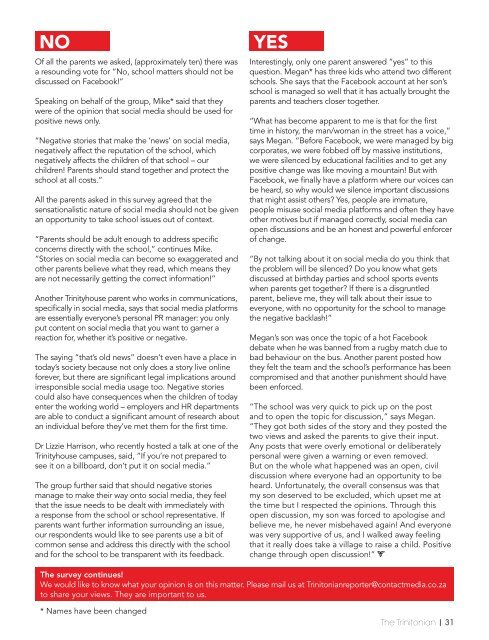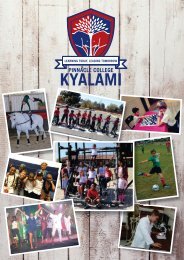TRINITONIAN ONLINE JAN 2018
You also want an ePaper? Increase the reach of your titles
YUMPU automatically turns print PDFs into web optimized ePapers that Google loves.
NO<br />
Of all the parents we asked, (approximately ten) there was<br />
a resounding vote for “No, school matters should not be<br />
discussed on Facebook!”<br />
Speaking on behalf of the group, Mike* said that they<br />
were of the opinion that social media should be used for<br />
positive news only.<br />
“Negative stories that make the ‘news’ on social media,<br />
negatively affect the reputation of the school, which<br />
negatively affects the children of that school – our<br />
children! Parents should stand together and protect the<br />
school at all costs.”<br />
All the parents asked in this survey agreed that the<br />
sensationalistic nature of social media should not be given<br />
an opportunity to take school issues out of context.<br />
“Parents should be adult enough to address specific<br />
concerns directly with the school,” continues Mike.<br />
“Stories on social media can become so exaggerated and<br />
other parents believe what they read, which means they<br />
are not necessarily getting the correct information!”<br />
Another Trinityhouse parent who works in communications,<br />
specifically in social media, says that social media platforms<br />
are essentially everyone’s personal PR manager: you only<br />
put content on social media that you want to garner a<br />
reaction for, whether it’s positive or negative.<br />
The saying “that’s old news” doesn’t even have a place in<br />
today’s society because not only does a story live online<br />
forever, but there are significant legal implications around<br />
irresponsible social media usage too. Negative stories<br />
could also have consequences when the children of today<br />
enter the working world – employers and HR departments<br />
are able to conduct a significant amount of research about<br />
an individual before they’ve met them for the first time.<br />
Dr Lizzie Harrison, who recently hosted a talk at one of the<br />
Trinityhouse campuses, said, “If you’re not prepared to<br />
see it on a billboard, don’t put it on social media.”<br />
The group further said that should negative stories<br />
manage to make their way onto social media, they feel<br />
that the issue needs to be dealt with immediately with<br />
a response from the school or school representative. If<br />
parents want further information surrounding an issue,<br />
our respondents would like to see parents use a bit of<br />
common sense and address this directly with the school<br />
and for the school to be transparent with its feedback.<br />
YES<br />
Interestingly, only one parent answered “yes” to this<br />
question. Megan* has three kids who attend two different<br />
schools. She says that the Facebook account at her son’s<br />
school is managed so well that it has actually brought the<br />
parents and teachers closer together.<br />
“What has become apparent to me is that for the first<br />
time in history, the man/woman in the street has a voice,”<br />
says Megan. “Before Facebook, we were managed by big<br />
corporates, we were fobbed off by massive institutions,<br />
we were silenced by educational facilities and to get any<br />
positive change was like moving a mountain! But with<br />
Facebook, we finally have a platform where our voices can<br />
be heard, so why would we silence important discussions<br />
that might assist others? Yes, people are immature,<br />
people misuse social media platforms and often they have<br />
other motives but if managed correctly, social media can<br />
open discussions and be an honest and powerful enforcer<br />
of change.<br />
“By not talking about it on social media do you think that<br />
the problem will be silenced? Do you know what gets<br />
discussed at birthday parties and school sports events<br />
when parents get together? If there is a disgruntled<br />
parent, believe me, they will talk about their issue to<br />
everyone, with no opportunity for the school to manage<br />
the negative backlash!”<br />
Megan’s son was once the topic of a hot Facebook<br />
debate when he was banned from a rugby match due to<br />
bad behaviour on the bus. Another parent posted how<br />
they felt the team and the school’s performance has been<br />
compromised and that another punishment should have<br />
been enforced.<br />
“The school was very quick to pick up on the post<br />
and to open the topic for discussion,” says Megan.<br />
“They got both sides of the story and they posted the<br />
two views and asked the parents to give their input.<br />
Any posts that were overly emotional or deliberately<br />
personal were given a warning or even removed.<br />
But on the whole what happened was an open, civil<br />
discussion where everyone had an opportunity to be<br />
heard. Unfortunately, the overall consensus was that<br />
my son deserved to be excluded, which upset me at<br />
the time but I respected the opinions. Through this<br />
open discussion, my son was forced to apologise and<br />
believe me, he never misbehaved again! And everyone<br />
was very supportive of us, and I walked away feeling<br />
that it really does take a village to raise a child. Positive<br />
change through open discussion!” `<br />
The survey continues!<br />
We would like to know what your opinion is on this matter. Please mail us at Trinitonianreporter@contactmedia.co.za<br />
to share your views. They are important to us.<br />
* Names have been changed<br />
The Trinitonian | 31


















